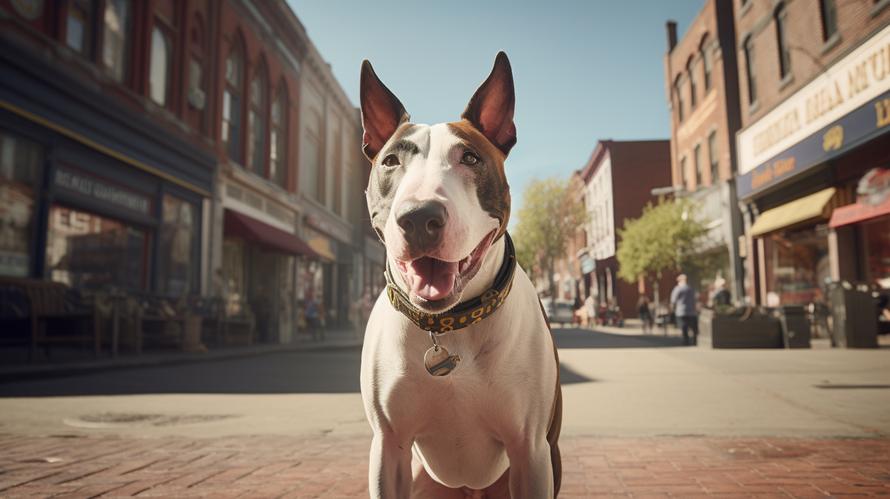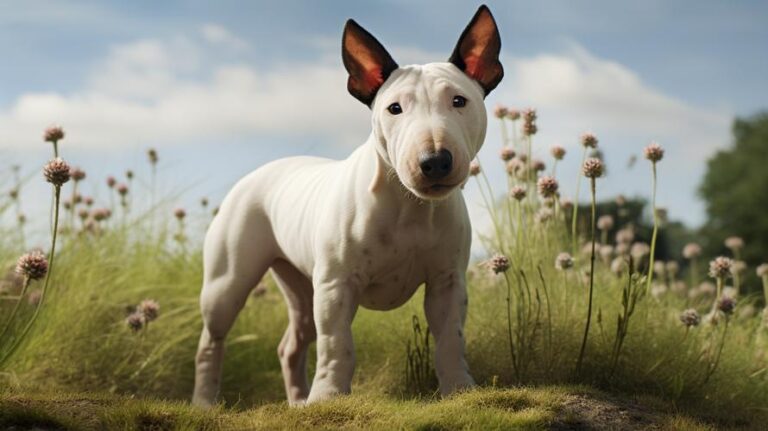It’s a question plenty of pet parents scratch their heads over – one that may seem a little baffling at first. But here’s a fact you might not know. Dogs and wolves share 99.9% of their genetic makeup. Just like you and your second cousin, Doug. Yes, that Doug! Interesting, right?
Now, wolves are full-time carnivores. Dogs have evolved alongside humans and have generally adapted to our more varied diet… but that ancestral carnivorous tendency remains strong. This fun fact has us asking an interesting question: Should a Bull Terrier eat grain-free?
There’s a whole lot of debate out there about this topic. Opinions vary from veterinarian to veterinarian, and dog owner to dog owner. So, let’s plunge headfirst into the fray and see if we can come up with a clear, definitive answer, and in the process, learn more about how to best take care of our beloved Bull Terrier companions!
Let’s set the stage first. Bull Terriers are charming, energetic, and all-around lovable pups that are the perfect addition to many homes. They exude a kind of gregarious vitality, with a playfulness that can bring joy to any household. But much like us humans, they also have specific dietary needs that can influence their health, behavior, and overall happiness. Ensuring these needs are met is a crucial part of being a responsible pet parent.
So, as pet parents, should we encourage a grain-free diet? Or should we stick to the traditional path of dog food?
Before we dive into the details, let’s go over what the term “grain-free” actually means. When we’re talking about grain-free diets for dogs, we’re talking about diets that don’t contain cereals like wheat, corn, rice, oats, barley, or rye. These diets gained popularity in recent years, promoted as a healthier and more natural alternative to conventional dog foods. However, they’ve also attracted controversy due to associations of certain health risks which we will explore further.
Unlike cats, which are obligate carnivores, dogs can technically survive without meat in their diet, and they can digest grains. However, survival and thriving are two different things. Dogs, like Bull Terriers, may still do best on a primarily meat-based diet, despite thousands of years of domestication and adaptation. Why? Basically, their bodies are still suited to a carnivorous diet in many ways. Carnivorous animals have different nutritional needs compared to herbivorous or omnivorous animals, which is where the idea of a grain-free diet comes from.
But, back to our beloved Bull Terriers. Current evidence suggests that while Bull Terriers can digest grains, some of them – a small minority in fact – may have grain allergies or sensitivities. In these cases, a grain-free diet can result in less itching, shedding, and skin problems, better weight management, and even better digestion and stool quality. If your Bull Terrier is allergic to grains or shows signs of grain sensitivity, such as frequent itching or poor coat condition, then a grain-free diet could potentially benefit him or her.
However, not all grains are bad, and certainly not all Bull Terriers are grain intolerant. In fact, the vast majority of Bull Terriers won’t suffer from any grain allergies or sensitivities. The most common food allergens in dogs are actually proteins like beef or chicken, not grains. Grains are a good source of energy, and they also provide essential nutrients like fiber and vitamins. So, unless your dog has a proven grain allergy or intolerance, there’s no reason to avoid grains completely.
But, where things get a bit more complex is when we talk about a condition called Dilated Cardiomyopathy (DCM). Recent FDA investigation linked grain-free diets rich in peas, lentils, potatoes, and other legume seeds to this heart condition in dogs. While the specific cause of DCM is still not fully understood, some brands of grain-free dog food have been implicated as possibly contributing to its occurrence. It’s important to emphasize this connection isn’t a definitive cause-and-effect, but it might be another reason to rethink the idea of a grain-free diet unless it’s necessary due to a diagnosed allergy.
When it comes to nutrition and diet for your Bull Terrier, one-size-fits-all advice doesn’t apply very well. Every dog is unique – much like their owners – and what works well for one Bull Terrier might not work as well for another. Working closely with your vet will help you find the optimal diet plan for your furry friend. While grain-free diets can be a lifesaver for dogs with grain allergies or sensitivities, they’re not inherently superior or healthier for dogs without these issues.
In conclusion, there are reasons veterinarians might recommend a grain-free diet, but it’s not right for every Bull Terrier. Feeding grain-free isn’t something to be done lightly due to potential health risks and should be considered primarily for animals that are mildly to severely intolerant of grains.
Sharing our lives with dogs means we have the critical job of ensuring they are taken care of health wise, and part of that includes their food. By taking the time to understand the complexities of their diet, we take a giant leap in ensuring we have a happy, healthy companion. That’s a reward in itself, don’t you think?
So, whether a grain-free diet is the best choice for your Bull Terrier largely depends on your individual dog’s health and nutritional needs. Remember, always consult with your veterinarian before making any significant changes to your pet’s diet. And of course, keep giving your Bull Terrier the love and attention they deserve! Your bully’s tail wag of approval is always the best indicator that you’ve made the right choice.



